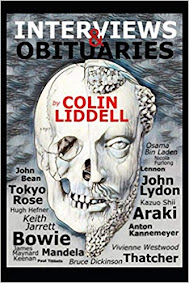by Alex Kurtagic
On 13 December 2010 the BBC News online magazine ran a feature about Toby Ord (above), the 31-year-old man who has pledged to give away £1,000,000 to fight against global poverty over his lifetime. What distinguishes Ord from the likes of Bill Gates and fellow billionaires is that the former exists on an annual income of £25,000 ($40,000), which means that he gives away to charity everything he earns over £18,000, or £833 a month out of an income of £1,583 after tax. This is on top of his entire savings of £15,000, which he has already given away.
In order to achieve this, he lives in a sparse one-bedroom flat, which he rents from his employer; eats out only once a fortnight; and has a cup of coffee only once a week. He also has no children, which enables his wife, a medical doctor, to give away part of her income as well.
What motivated this man to make such an unusual commitment?
Ord tells us that as a university student he was idealistic, and that he would be rebuffed by his fellow students, eager to shut him up, for what appears to have been his incessant pontificating about poverty in Africa. While doing a Master’s degree, in which he studied ethics and philosophy, Ord decided to give away most of his money to help save lives abroad.
He says,
When it began, I would be down in the supermarket agonising about whether to buy a more expensive cereal or not but I realise that’s a road to a nervous breakdown and that it was much more sensible to work out at the start what you can live on [give away the rest in a lump sum] and then after a year readjust - can I live on less, am I pushing it too hard - instead of perpetually agonising about it.
It seems the agony stemmed from comparing his situation to that of people in the rest of the world:
When I was earning £14,000 as a student, I found I was in the richest 4% in the world, even adjusting for how much further money goes in developing countries.
Frankly, I have great difficulty understanding this mentality, and it is impossible for me to sympathise with it in any way.
It is not that I think he is ruining his life by doing without luxuries: luxuries mean a great deal to a materialist, whose identity is often linked to his possessions; idealists can derive a superior sense of well-being by sacrificing for a super-personal cause. It is not that I think he is using the wrong method, as some commenters have pointed out, and limiting his lifetime impact by donating as he goes along: I would rather his impact be as limited as possible. And it is not that I think he will eventually come to regret giving away so much of his money, since no one will help him in his old age, when he finds himself in abject poverty: it is his decision and he will have to accept any personal consequences, no matter how grim. No. What bothers me is that his idealism, because misplaced, is not only foolish, but also dangerous, and the consequences are likely to be felt by all of us.
Ord has calculated that his lifetime efforts will save thousands of lives in ‘developing’ countries—places where fertility is very high. He has organised a campaign called Giving What We Can, and recruited 64 others like him. According to Ord, each person in the United Kingdom can potentially transform thousands of lives in the poorest regions of the Earth. My worry is that without a drastic reduction in fertility, whatever aid money is not siphoned off by corrupt governments and cleptocracies, will further fuel the unsustainable population boom we have seen during the past half century. The demographic explosion has only spread and aggravated the poverty, which in turn has only exacerbated migratory pressures, and created more, poorer, hungrier immigrants in the Third World, who continue to dream of claiming for themselves an ever larger slice of the European pie. Ord will spend his life exacerbating this already intractable problem, and recruiting charitable souls to do the same, only so that he can alleviate his hypertrophic feelings of guilt and live at ease with himself.
Another problem is what is not being done as a result of this ill-conceived drainage of funds. I am not merely talking about the National Health Service in Britain, or about the crumbling public infrastructure, or about the elderly pensioners forced to choose between eating and freezing or starving and heating themselves every winter. I am also talking about research to find cures for liver disease, cancer, and blindness; about the space programme; about the preservation of our artistic heritage; about discovering and developing cheap, environmentally friendly, and effective sources of energy. It is easy to see how progress on several of these fronts would be of immense and lasting benefit, which would be felt for many generations; but none seem to fall under Ord’s radar. Why? Probably because the tithing of surplus income to charity is not about bettering the lives of others but about bettering the life of Ord, and quieting the screeching demon inside his mind that tells him that the world’s ills are his fault and that every degree in his central heating’s thermostat is a child that dies of malnutrition in some wretched corner of the Earth.
As is to be expected, Ord has received very mixed reactions: some are highly praising, others acidly critical. Among the latter one cannot help but detect an instinctive revulsion, which is manifest despite efforts to conceal it with insincere praise and oblique criticisms, such as:
I don't want to belittle what is clearly a very significant and generous gesture but this couple’s combined income AFTER charity giving is significantly more than my household income with three children to raise.
Or:
Sad thing is when he is old and low on money because he has given his wealth away then he will find that nobody is willing to help him. For sure he will find that he has given away far too much. Giving what you can afford is one thing but he is giving away far more than he can afford for sure.
Or:
Interestingly, If they were to take the same amount of money and invest it wisely, (shares, real-estate etc) I strongly suspect that once growth kicks in they could give away far more total money over their lifetime, whilst also building up a stock of assets that will provide for them into retirement. These assets could then be given to chosen charities as a bequest when no longer needed. I'm not criticising the sentiment or the action - just the method.
Is this the incomprehension of bourgeois materialism speaking? Certainly in many cases. Is this miserable envy in the face of what is taken as extraordinary virtue? Certainly in some cases. Is this secret resentment in the face of implicit guilt-mongering? I would not be surprised at all. There is, certainly, something oddly irritating and repellent about an over-educated, middle class White man with two Macs and an iPhone pontificating publicly about poverty in Africa and who agonizes—to the point of fearing a nervous breakdown—over whether buying himself a more expensive kind of cereal is really ethical. I suspect some find him rather pathetic, even if they dare not say it for fear of social sanction. But I also encountered a similar feeling of irritation and repellence around the time Bob Geldof ran his absurd Live8 campaign some five years ago. To me both Ord and Geldof represent a peculiar species of Western man—one that is pathological, the result of a subclinical neurological condition, of some form of psychological hypertrophia, that afflicts them with chronic and overpowering feelings of guilt and a totalitarian universalist outlook that tolerates no inequality and no dissidence. Some have called him homo equalis.
There is nothing wrong with the view that money over and above what is needed for adequate living can be better spent elsewhere. Many who appreciate this website have thought so and acted in consequence when they sent in their donations. What is unfortunate is that it is the most noxious and misguided kind of idealist that, along with fashion-conscious celebrities, routinely performs the most spectacular acts of generosity, and is able to recruit others to imitate their example. If only those millions, indeed those billions, were put to work on useful, positive, and constructive causes, rather than, directly or indirectly, on making poverty in Sub-Saharan Africa, an even greater threat to European civilization than it already is.
The supreme irony is that, for the reasons I have stated elsewhere, what will help in many parts of the ‘developing’ world is money being drained out, rather than pumped in.
The kindest outcome would be for Ord to find ways to make even greater savings and give away an even greater proportion of his income, lest he achieves any kind of dangerous wealth; to choose giving money away to distant strangers over reproducing himself, lest he pass on the gene; and to help others like him to decimate their own wealth, so that they may lose access to resources and become less influential. This would still cause damage, but it would be limited. History suggests, however, that this charitable enterprise could well end in tragedy. We have already seen examples of naïve, idealistic Westerners who have gone to fight poverty and injustice in the Third World, only to get themselves killed—sometimes by the same people they sought to help. As both differential birthrates and the ongoing population transfer from the Third World into the West causes the latter to converge with the former, we can expect the West increasingly to resemble the parts of the world that are now the objects of Western charity. I doubt a Toby Ord would be safe in such a chaotic and brutal environment, or that he would be able defend himself and any chargees from its predations: he is and looks very much the product of a rather cosseted, peaceful, stable, prosperous—and dare I say monastic?—environment; he is, in fact, only possible because of the privileged environment that gives him such moral travails.
In Toby Ord we are witnesses to over two centuries of liberalism. Let’s end it.




























No comments:
Post a Comment
Your comment will appear after it has been checked for spam, trolling, and hate speech.